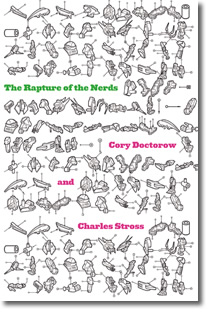The Rapture of the Nerds: Book review

"Neat ideas are the most dangerous kind," observes a character in The Rapture of the Nerds (a phrase originally uttered by a Ken MacLeod character). We're in the novel jointly written by Charles Stross and Cory Doctorow, and the 'neat idea' in this case is a flash conspiracy that gets an Arthur Dentish sort of guy named Huw Jones invited to a party because he has the right genome for infection with a sort of intergalactic DNA spam and then put on a jury panel-cum-reality show to assess a form of synthetic life created by a pair of super-brainy three-year-old twins. Another character calls it a "self-propagating teleology meme".
If this doesn't sound much like your idea of a good time, well, it isn't Huw's either. But at least he has a state-issued teapot with a wisecracking djinni inside it. Things could be worse. Until Huw's mother takes a nanomanipulator saw to Huw's head and unwinds the brain. She says it's being digitized and uploaded so Huw can be immortal along with billions of others roaming the universe vaporizing planets for enough 'computronium' to keep the whole thing going. Huw calls it murder.

Determined to resist the brave new digital world of infinite possibilities Huw now finds herself in (yes, Huw has a mid-novel sex change), she spends the first two years elaborately constructing a simulation of life in rural Wales throwing pots. Which turns out to have been a bad idea, because now she's the only person who can testify to save the Earth from destruction and she doesn't have any of the necessary skills.
There is a school of thought that holds that someone transported to our time from the distant past would have a hard time surviving. What would they do? How would they cope with all the inventions of modern life? I've long believed the opposite: a caveman transported to our time might be scared of the cars, miserable in the buildings and incompetent with a computer, but once he found a bit of land he would know how to feed himself and build a shelter. By contrast, take one of us back to Paleolithic times and we wouldn't have a single skill necessary to survive: we'd probably be abandoned as quickly as possible as too big a burden on any group scrabbling for subsistence — I imagine us lying whimpering and shivering on a scrapheap begging a god for batteries and battery farms.
But Stross and Doctorow's late-21st century world probably really would defeat the caveman: what would he do in a simulated environment with emotional slider controls and physics that can be reconfigured at will? And yet, some things are familiar. Charleston, South Carolina, awash in evangelicals, still has no nationalised health insurance, so Huw is invited to pay for treatment with an actual leg and maybe a kidney.
I found this a difficult read — partly because of the density of the jokes and references, and partly because Stross and Doctorow's propsed world is so clearly somewhere I don't ever want to have to live. If the only alternative is death, though, would I prefer champagne or milk in my simulated bath?
The Rapture of the Nerds
By Cory Doctorow and Charles Stross
Published by Tor Books
350 pages
ISBN: 978-0-7653-2910-3
$24.99